Costa Rica translates to “Rich Coast” and for anyone who has ever visited, you know why. From calm coves to crashing surf, palm-tree-backed sands to rocky points, each beach offers something unique and beautiful. But even paradise has its problems. Plastic and other trash is a major issue along Costa Rica’s beaches. Today we are highlighting one organization, MareBlu, that is working hard to protect these natural treasures. We’re lending our support and will let you know how you can too.
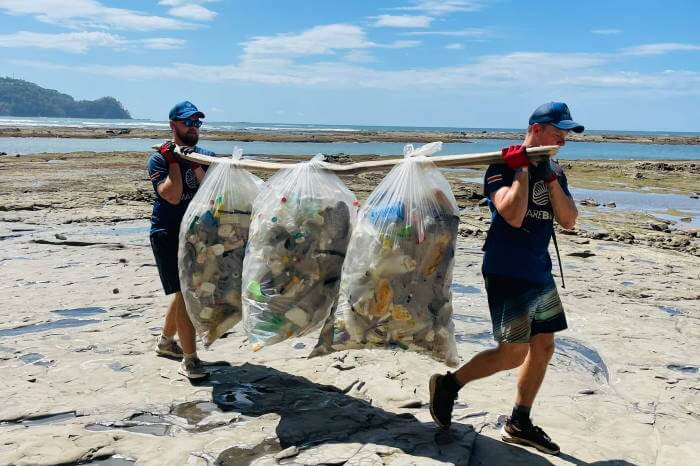
Background
While we would like to think Costa Rica is just about perfect, the truth is that like anywhere else, pollution is a major problem. Every day, thousands of pounds of plastic and other trash wash up along the country’s beaches. This is not only an eyesore but also bad for the local wildlife and sensitive marine ecosystems.
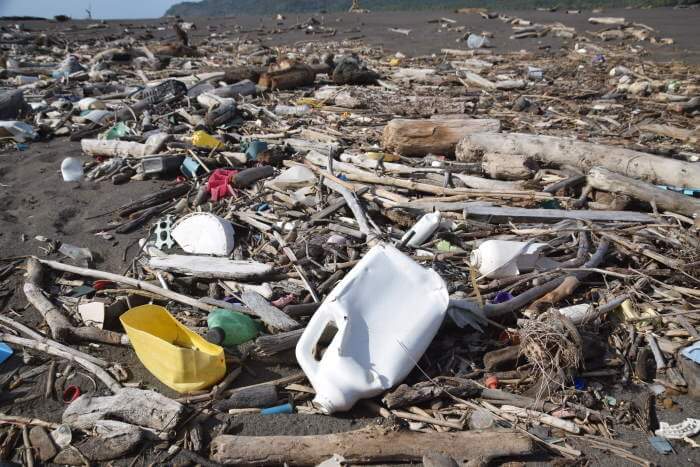
The trash comes from several places, but most is thought to flow into the sea from Costa Rica’s many rivers and streams. The biggest source is the San Jose metropolitan area and Tarcoles River, but smaller coastal communities also contribute.
Initiatives are in place to reduce illegal dumping and littering; however, those problems won’t be solved overnight.
MareBlu – Combating the Problem
Headquartered on Costa Rica’s central Pacific coast, the MareBlu organization is combating coastal pollution head on.
Geronimo Ciuti, the founder, grew up enjoying Costa Rica’s pristine beaches with his family. But as an adult, he noticed something had dramatically changed. Trash was washing up in huge quantities.
Passionate about the problem, he took a leap of faith, quitting his day job in San Jose and moving to the beach to start MareBlu.
Geronimo told us that in just 4.5 years, they have removed around 300 tons (660,000 pounds or 300,000 kg) of plastic from local area beaches!
Recruiting Help
While in the beginning Geronimo was collecting a lot of trash himself, he knew that he could not do it alone. With limited funds, he was inspired by other pay-to-volunteer programs. These groups charge a minimal amount to cover food and lodging and recruit volunteers looking for unique, educational experiences.
To date, MareBlu has hosted over 250 volunteers from more than 40 countries around the world. Individuals spend anywhere from one to six weeks living at the MareBlu base camp. There they learn all about the problem and Costa Rica in general, and are assigned various responsibilities within the organization.
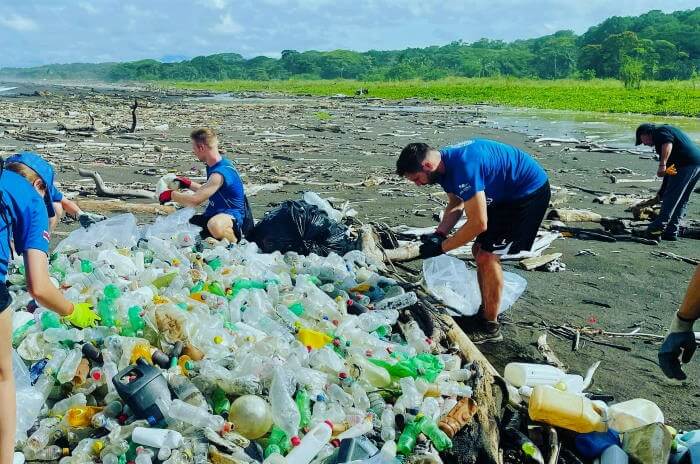
Beach Cleanups
Beach cleanups are the cornerstone of the organization’s work. Each week, MareBlu sends out its custom-built plastic-recovery expedition vehicle for beach cleanups.
Volunteers and sometimes local businesses and other organizations are mobilized along the beach to collect all the trash in sight.
This trash is loaded into bags, which the recovery vehicle then tows back to base camp.
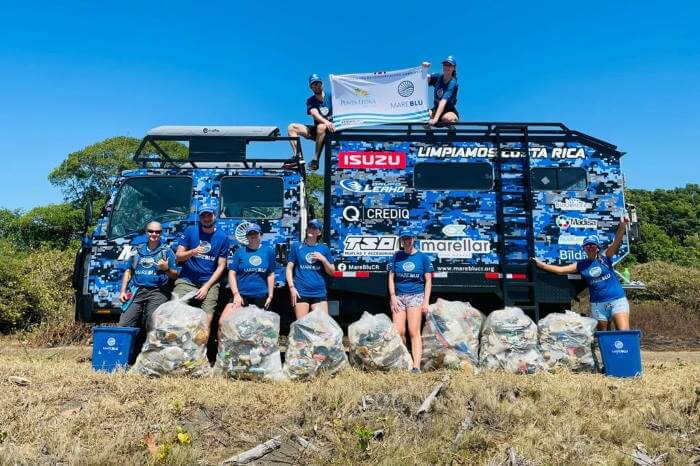
Plastic Processing
Most local beach cleanups fill bags and wait for trash trucks to pick them up. What’s different about MareBlu is that all the trash does not go into a landfill. Their goal is to send zero plastic to local landfills.
Back at base camp, volunteers sort all the plastic. It is then repackaged and sent in bulk truckloads to be upcycled. Each canvas bag holds around 220 pounds (100kg) of plastic waste.
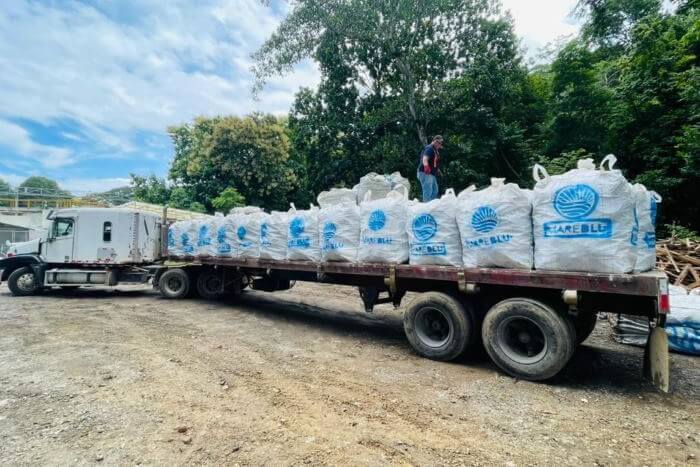
The organization hopes that soon, they will be able to purchase a shredder to cut the plastic into smaller pieces. Then they can load even more weight onto each truck (about nine tons).
This will cut down significantly on trucking costs and allow the program to send fewer loads with even more plastic.
Upcycling Beach Plastics
Using his former business skills in the textile industry, Geronimo and MareBlu have been able to partner with various industrial companies in Costa Rica. These companies have agreed to take the recycled plastic and incorporate it into different products.
Products range from concrete pavers and cement blocks to composite wood products and even asphalt. The plastic that is incorporated reduces the amount of raw materials needed. It is a win-win situation for everyone, including the environment.
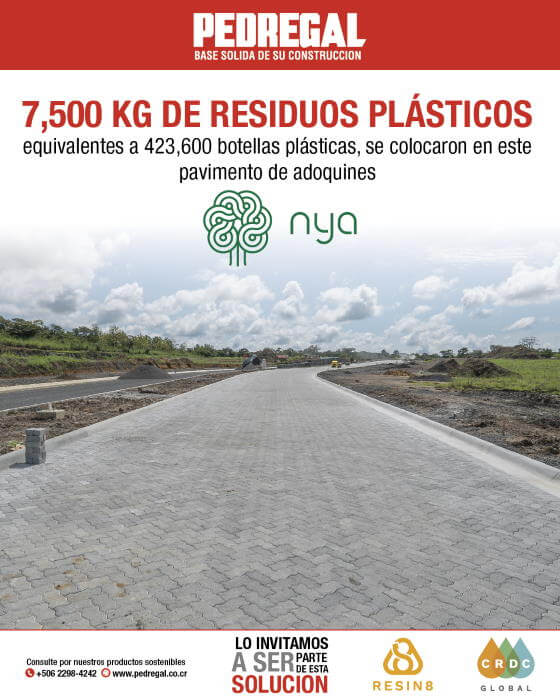
Compounding the Effort
While cleaning the beaches is important work, Paula Sanchez, MareBlu’s volunteer coordinator told us that volunteers can quickly get burnt out picking up trash all day. So, to keep things interesting and make more of an impact, the organization has other projects as well. Here are just a few.
Artificial Reefs
One exciting initiative is installing artificial reefs in the Playa Blanca marine reserve. This beach zone is just steps from the MareBlu base camp.
With backing from the Punta Leona Resort & Club, around 200 large concrete spheres will be placed, just offshore. These structures are specifically designed to promote coral growth. They also offer protection for fish and other marine species.
Volunteers at MareBlu get hands-on experience constructing these spheres and can see their placement in the nearby ocean waters.
This project has only recently started but already fish and corals are populating the spheres.
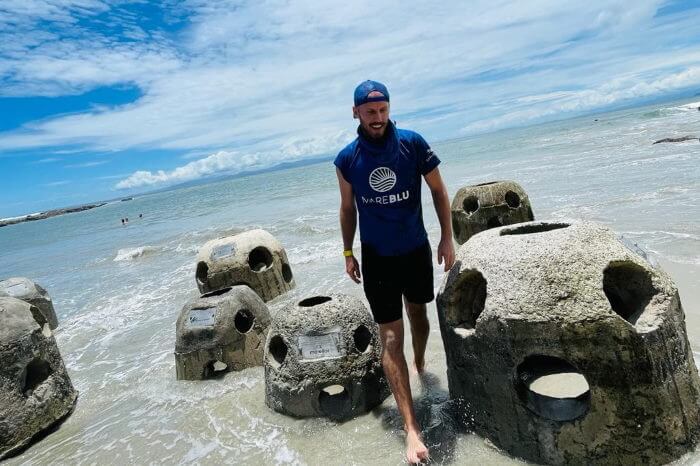
Beach & Neighborhood Plastic Collection
Only about 7% of plastics are recycled in Costa Rica. One of the MareBlu’s goals is to increase that number.
Volunteers have been installing giant turtle-shaped plastic collection sculptures along beaches, in parks, and near shopping centers.
Each turtle is collecting about 30-50 kg (65-110 pounds) of plastic per month. That is about a half ton of plastic, per turtle, per year.
This initiative has been very successful and new businesses have since been requesting their own plastic collectors. Maintaining these collection points is yet another job for the busy volunteers.
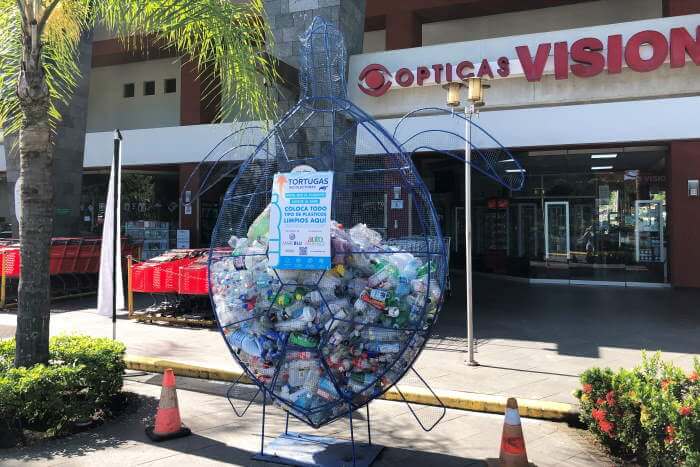
Turtle Hatchery
Although a smaller project within the organization, the turtle hatchery is a favorite among volunteers. While conditions along the beaches of Punta Leona, near the base camp, are not ideal for nesting sea turtles (there are many visitors, dogs, and other threats), there is evidence that more and more turtles are showing up to lay their eggs.
With the help of volunteers, the turtle eggs can be carefully moved to the safety of the hatchery. When the eggs fully develop and hatch, the baby turtles can then be released by volunteers as well.
Currently around three to five nests per year are being protected but there are hopes that this number will increase.
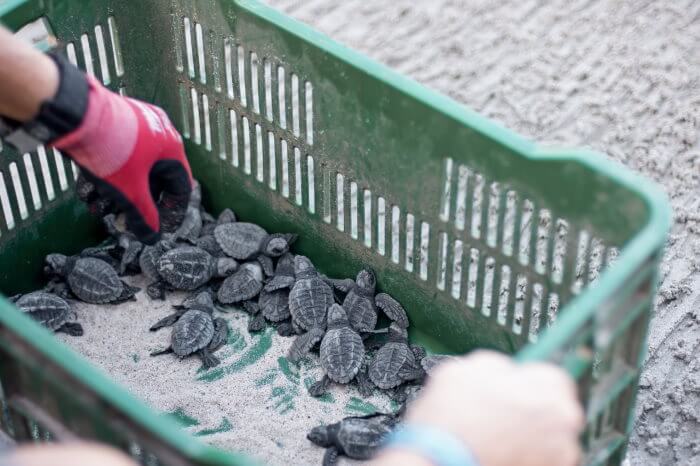
Growing a Movement
MareBlu is impressive as it stands but the organization and founder, Geronimo, are just getting started. They have plans to improve upon everything they are doing. They also will keep fostering new ideas to see how they grow. The plastic shredder is a perfect example. And Geronimo also mentioned that they would like to try to make some upcycled products onsite as well.
How We Are Helping and How You Can Too!
Currently the volunteer program at MareBlu keeps the day-to-day operations running and beach cleanups going. This is backbone of the organization.
The Punta Leona Resort & Club has generously hosted the organization’s base camp on their property. And while they are free to keep using the resort’s space, MareBlu needs to build a larger base camp and dorm for its volunteers. Luckily, the architectural plans are ready, and building is set to begin.
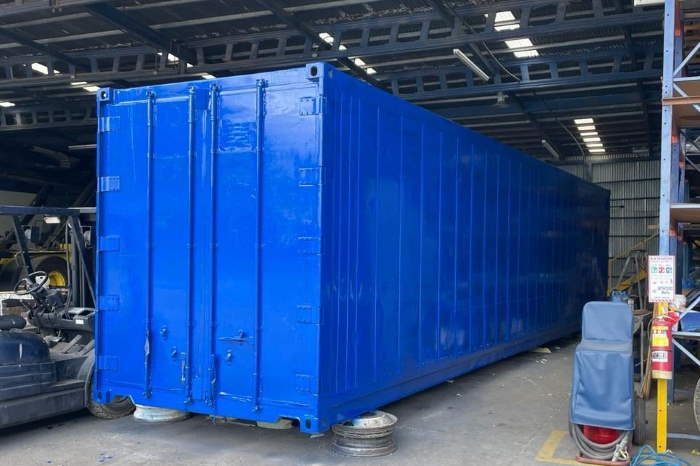
Our company Two Weeks in Costa Rica, Inc. has donated $5,000 toward this new project. But with our donation and other funds only 20% of project costs are covered.
If you’d like to help this great cause, you can donate through PayPal or by local Costa Rica bank transfer or international wire transfer. Visit their Get Involved page for details.
MareBlu is also always looking for corporate sponsors or individual volunteers. If you would like to volunteer, sponsor a cleanup, install a turtle sculpture, or contribute something else, reach out to them through their website or social media channels.
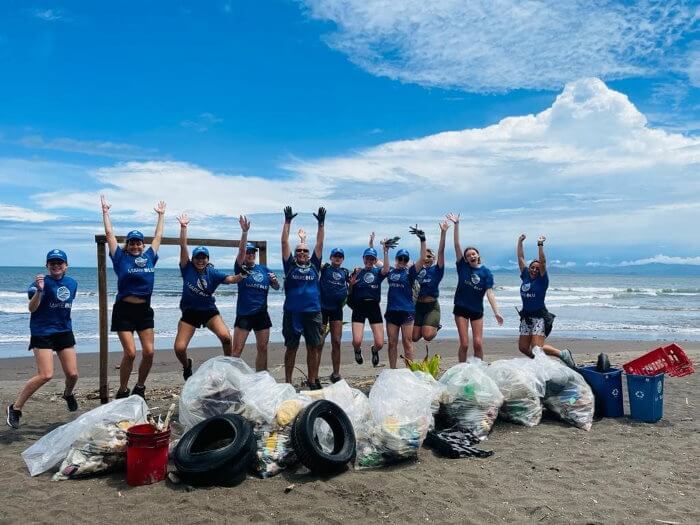
Conclusion
The beach and oceans are a big part of what makes Costa Rica a special place. If you have spent time under an almond tree, ridden a breaking wave, or played with your kids in the soft sand, you know that it is something worth protecting. We have been inspired by the work of MareBlu and hope that you are too. Let’s help them out and keep this movement going.
If you have made a contribution to MareBlu, leave us a comment below and tell us why it was important to you. This will inspire others to do the same.
Looking for more ways to give back to Costa Rica? Check out these posts:
Keeping Costa Rica Green: How We Are Giving Back – This tree-planting program that we support in Costa Rica’s Southern Zone is using existing farmers and landowners to regrow the rainforest.
Shuttle Booking Service – We book private shuttle transportation throughout the country. When you place an order, you have the option to add a donation to our tree-planting initiative.
Macaws Flying Free: A Visit to the Ara Project – This breeding center in Punta Islita has been helping increase the population of Scarlet and Great Green Macaws. It’s a fun visit from Nosara or Samara.

Saw them on Playa Bandera in Parrita a few weeks ago. We were immediately impressed with their professionalism and drive. We handed one of their volunteers a cash donation at the time and plan on giving more. We have owned our home on the beach here for 18 years and have seen great improvements in beach cleanups and turtle conservation and propagation. Thanks for highlighting this group in your newsletter.
I have another suggestion on a story for you. There is a fellow on the beach here named Victor Carmona. He has grown up on this beach and is a caretaker for a property of our friends. He took it upon himself to start a turtle hatching facility I believe about 6 or so years ago. Before that, my wife and I would walk the beach every morning since 2004. Every turtle nest for the most part we found was already dug up by people. Very distressing! Victor has released about 15000 turtles this year alone! He invites local school children to take part and is teaching the locals that this is what needs to be done. This is a really nice story here that we are thrilled about.
Hi John, that’s exactly how we encountered them on the beach near us as well. The volunteers were doing such a great job and we then looked more into the organization more. Glad we did!
Yes, we have heard about Victor’s work on Playa Bandera with the turtles. Also really inspiring. Maybe we can get in touch with him for a future article, thanks for that tip!
Great article. I just returned from Belize and the plastic problem is enormous there too, but I still see all the stores using plastic bags and single use everything. Is Mareblu or the Costa Rica government involved in reducing their reliance on some plastics? It’s an enormous problem, but getting at the source is an issue too of course. I look forward to my next visit to Costa Rica and hopefully I can either donate or work some of the time as a volunteer.
Hi Elizabeth, yes the Costa Rica government is passing laws to reduce plastic use and other single use trash. So far they have banned plastic straws, plastic shopping bags (at some establishments) and Styrofoam take out containers. Many businesses are also trying to do their part by offering alternatives like bamboo or plant-based straws and compostable take out containers. And grocery stores (especially large chains) are not offering bags at all and/or charging for reusable bags or paper bags. It’s steps in the right direction but a lot still needs to be done. That would be amazing if you can help out Mareblu in some way, thank you!
I am so glad what you guys have acomplished! Keep up the good work.Lots of love, xoxo Miranda